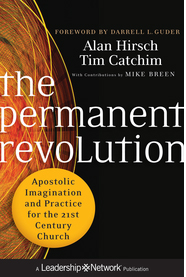
DARREN CRONSHAW takes a look at a book championing innovation in church mission…
Alan Hirsch and Tim Catchim
The Permanent Revolution: Apostolic Imagination and Practice for the 21st Century Church
Jossey-Bass Leadership Network Series, San Francisco, Jossey-Bass, 2012
ISBN-13: 978-1301932900
 |
“As a pastor and denominational resource-person, I especially appreciated the framing of apostolic leadership as guarding missional DNA, extending Christianity into new ground, fostering glocal relationships, creating environments for other ministries to flourish and developing health in church systems.” |
There is a mushrooming of literature on missional church but little that focuses on what is distinctly the theology, nature and working of apostolic leadership that stimulates missional imagination, champions innovation, and gives a lead in pioneering new expressions of church. The Permanent Revolution helps fill the gap.
Alan Hirsch is founding director of Forge Mission Training Network and co-leader of Future Travelers, a program for American megachurch leaders fostering missional movements. Considered a key strategist and leading thinker on Mission to the Western World, his previous books include The Forgotten Ways and (co-authored with Michael Frost) The Shaping of Things to Come. His co-author is Tim Catchim, a church planter currently leading Ikon, a network of missional communities in Tennessee.
They argue that Jesus intended the church to be a “permanent revolution”, borrowing the Trotskian term to describe the ideal of ongoing renewal and movement. A simple solution for the church to grow and mature, in terms of its capacity to represent the mission of Jesus, is the synergism of Apostolic, Prophetic, Evangelistic, Shepherding and Teaching (APEST) roles of Ephesians 4. The book outlines the Biblical basis of APEST ministry, bemoans the exegetical and historical neglect of this aspect of the passage and argues the church needs to move on from the marginalisation of the generative APE types in favour of shepherding and teaching roles. It focuses then on developing the nature of apostolic ministry as catalytically important for leading the church forward in a missional movement.
It offers a theological basis for apostolic leadership, necessary when many have assumed apostolic leadership is only for the original 12. The book is also full of valuable practical advice on how different roles synergise, where they work best, what happens if a church is imbalanced on one role, and how apostolic leaders can encourage risk-taking, be permission-giving, orchestrate innovation, navigate change and help churches get in touch with their radical roots. I look forward to trialling their suggestion to use De-Bono styled APEST hats with a leadership team.
As a pastor and denominational resource-person, I especially appreciated the framing of apostolic leadership as guarding missional DNA, extending Christianity into new ground, fostering glocal relationships, creating environments for other ministries to flourish and developing health in church systems. Hirsch and Catchim helpfully advocate both a Pauline model of pioneering, but also a Petrine mobilising/remissionalising/reforming models.
Denominations and existing churches need this kind of apostolic framework for organisational re-envisioning around mission. And we need research and development for new forms of mission, but integrally related to the broader system, working with and within the organisation. Observing the decline of the church in the West reminds me of the importance of the apostolic bias Hirsch and Catchim advocate: “If we hope to be a missional movement in our age, we must set about designing and biasing the church to be the high-impact missional agency it was intended to be in the first place.” Rethinking how we recruit, train, empower and function as apostolic leaders needs serious focus in our churches, seminaries and denominations.
The Permanent Revolution is excellent reading for church leaders, church planters, those who function as any kind of apostolic leader, and those who train and resource them.
This review was originally published in Mission Studies 30 (Spring 2013), 113-114.





